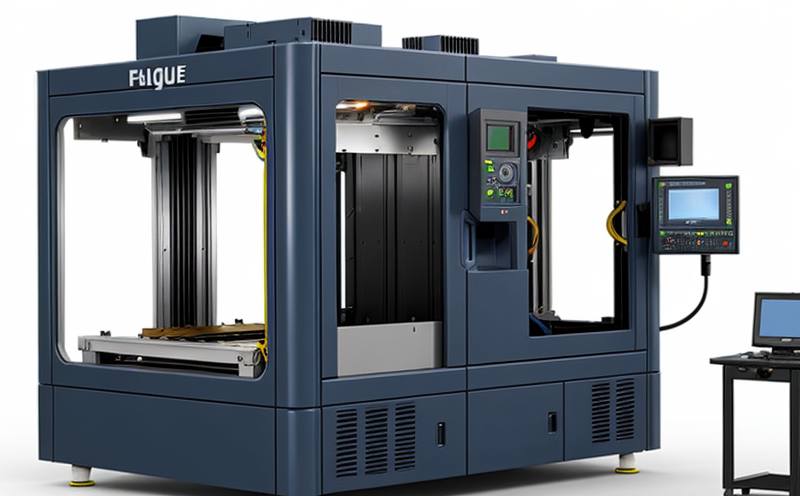ASTM F3122 Lifecycle Testing of AM Metallic Components
The ASTM F3122 lifecycle testing standard is a critical tool in ensuring the reliability and durability of additive manufactured (AM) metallic components. This test evaluates the fatigue life, mechanical properties, and structural integrity of these parts under real-world conditions, which are essential for industries like aerospace, automotive, and medical devices.
ASTM F3122 tests simulate the loading cycles that a component might experience during its operational lifecycle, from initial use to end-of-life. This process involves subjecting specimens to repeated stress until failure occurs or pre-specified fatigue limits are reached. The test helps manufacturers identify potential weaknesses in design or manufacturing processes that could lead to premature failures.
The testing procedure typically begins with the selection of appropriate specimen dimensions and materials, which must adhere strictly to ASTM F3122 guidelines. Specimens undergo rigorous preparation before being placed into a fatigue testing machine capable of simulating cyclic loading conditions. The testing environment is controlled to ensure accurate results, including temperature, humidity, and atmospheric pressure.
The test report includes detailed information on the specimen's geometry, material composition, environmental conditions during testing, and the precise load cycles applied. It also documents any observed phenomena such as microstructural changes or localized damage that could indicate early signs of fatigue failure.
By adhering to ASTM F3122 standards, manufacturers can demonstrate compliance with industry regulations while providing assurance about their products' longevity and safety. This testing method is particularly valuable for companies developing new AM processes or materials where traditional manufacturing techniques do not apply.
The results from ASTM F3122 testing play a pivotal role in decision-making processes regarding component design, material selection, and process optimization. They help ensure that components meet stringent performance requirements throughout their intended service life.
Eurolab Advantages
At Eurolab, we offer unparalleled expertise in ASTM F3122 lifecycle testing for additive manufactured metallic components. Our state-of-the-art facilities provide the necessary infrastructure to conduct these tests accurately and efficiently.
We employ highly qualified technicians who are certified according to international standards, ensuring that every test adheres strictly to ASTM F3122 guidelines. Our comprehensive suite of equipment allows us to simulate various loading conditions, making our results highly reliable and repeatable.
Our commitment to quality extends beyond just meeting regulatory requirements; we strive to exceed them by providing detailed reports that go beyond mere compliance. These reports offer valuable insights into the behavior of your components under fatigue loads, helping you make informed decisions about future designs and improvements.
In addition to our technical capabilities, Eurolab offers exceptional customer service, ensuring seamless communication throughout the testing process. From initial consultation through final report delivery, we maintain open lines of dialogue to ensure that all parties involved are well-informed at every stage.
Why Choose This Test
Choosing ASTM F3122 lifecycle testing is crucial for several reasons. Firstly, it provides a robust framework for evaluating the fatigue life and structural integrity of additive manufactured metallic components under realistic operating conditions. This ensures that products not only meet but exceed industry standards.
The test offers significant advantages over other methods by providing detailed insights into how components will perform in their actual applications. By identifying potential weaknesses early on, manufacturers can address issues before they become critical problems, reducing the risk of costly recalls or safety hazards.
Furthermore, ASTM F3122 testing supports continuous improvement efforts within organizations by offering valuable data that can be used to refine manufacturing processes and enhance product quality. This leads to more efficient production lines and higher-quality end products.
Use Cases and Application Examples
| Use Case | Description |
|---|---|
| Aerospace Components | This use case involves testing parts that are critical to aircraft safety and performance. For instance, turbine blades or engine components subjected to extreme temperatures and high-pressure environments require rigorous fatigue tests. |
| Medical Device Implants | The longevity of implants such as hip replacements is paramount for patient well-being. Testing these components ensures they can withstand the stresses of daily use over many years without failure. |
| Automotive Parts | Engine components like pistons and connecting rods must be durable enough to last through countless engine cycles. ASTM F3122 testing helps ensure these parts meet durability expectations. |
| Application Example | Description |
|---|---|
| Titanium Alloy Parts for Aerospace Engines | This example highlights the testing of titanium alloy parts used in jet engine turbines. These components experience extremely high temperatures and pressures, necessitating thorough fatigue testing to ensure safety. |
| Stainless Steel Orthopedic Screws | The durability of orthopedic screws is crucial for surgical success. Testing these screws under cyclic loading conditions helps verify their ability to maintain integrity over extended periods. |





